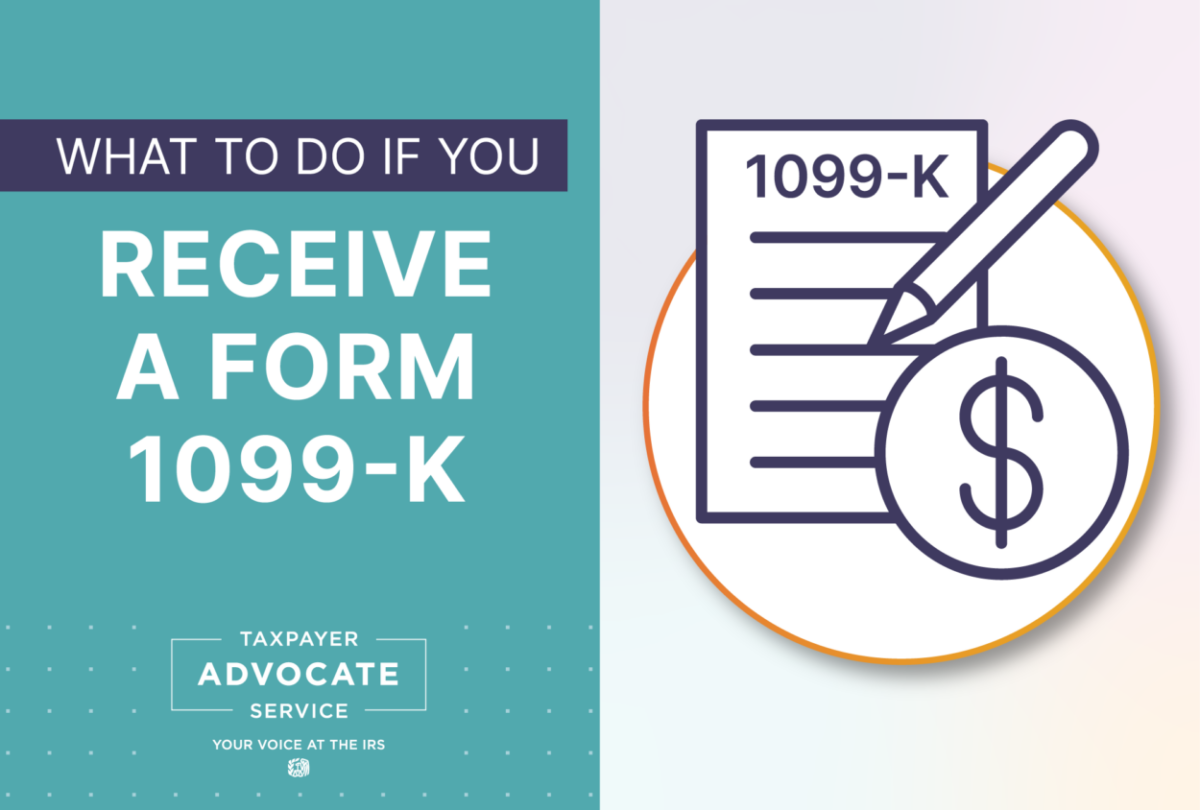Published: | Last Updated: December 22, 2025
I received a Form 1099-K

The One, Big Beautify Bill retroactively reinstated the reporting threshold in effect prior to the passage of the American Rescue Plan Act of 2021 (ARPA) so that third party settlement organizations are not required to file Form 1099-K unless the gross amount of reportable payment transactions to a payee exceeds $20,000 and the number of transactions exceeds 200.
There is no change to the taxability of income; the only change is to the reporting rules for Form 1099-K by TPSOs. Like before, income from part-time work, side jobs, or the sale of goods or services is still generally taxable.
Taxpayers must report all income on their tax return unless it is excluded by law, whether they receive a Form 1099-NEC, Nonemployee Compensation; Form 1099-K; or any other information return.
A Form 1099-K reports the gross amount of payments from credit cards, digital payments via TPSOs, and freelance platforms that manage payments between two parties. A separate Form 1099-K is issued by each payor.
If you had a side gig or online shop or sold items through an online marketplace and received a Form 1099-K, you must file a tax return if any of the following apply:
If you are selling used items and sold the items for less than their original purchase price, see What should I do? How should I report the sale of personal property reported on Form 1099-K?
In most instances, the answer is yes. An individual whose net income is $400 or more is subject to self-employment tax and federal income tax, and you will need to file a Schedule SE with your tax return. For more information on self-employment tax, see Self-Employed Individual Tax Center.
Self-employment tax does not apply to the sale of personal items reported on Schedule D, Capital Gains and Losses. Read more on Self-Employment taxes here.
No, personal transactions between friends and family and gifts are not taxable and should not be reported on a Form 1099-K. Taxpayers can minimize the chance of errors by asking friends or family members to correctly designate personal transactions. The taxpayer should also make a note of the payment’s purpose and the sender.
You should report the income from Form 1099-K payments on Form 1040, U.S. Individual Income Tax Return, Schedule 1, Additional Income and Adjustments to Income, Schedule C, D, E, or F, depending on the nature of the income.
The gain or loss from personal property is generally the difference between the amount for which you purchased the item and the sales price. A gain on the sale of personal property is taxable and will be reported on Form 8949, Sales and Other Dispositions of Capital Assets, and Form 1040, U.S. Individual Income Tax Return, Schedule D, Capital Gains and Losses.
A loss is not deductible, but it still needs to be reported on Schedule 1, Additional Income and Adjustments to Income. For tax year 2024 enter the amount of personal items sold at a loss in the entry space at the top of the Form 1040, Schedule 1. For more information on reporting losses for tax years prior to 2024 see, What to do with Form 1099-K.
You may have received a Form 1099-K in error for personal transactions, e.g., for transactions between friends and family or expense sharing.
If you receive a Form 1099-K in error or if the information on the form is wrong, contact the issuer of the Form 1099-K immediately. The issuer’s name appears in the upper left corner on the form along with its phone number. Taxpayers should keep a copy of all correspondence with the issuer for their records.
For more information, see Actions to take if a Form 1099-K is received in error or with incorrect information.
If you can’t get a corrected Form 1099-K for tax years 2024, report the information in the space at the top of Schedule 1 (Form 1040), Additional Income and Adjustments to Income. For details and information for tax years prior to 2024, see Actions to take if a Form 1099-K is received in error or with incorrect information | Internal Revenue Service (irs.gov).
The Taxpayer Advocate Service is an independent organization within the IRS that helps taxpayers and protects taxpayers’ rights. We can offer you help if your tax problem is causing a financial difficulty, you’ve tried and been unable to resolve your issue with the IRS, or you believe an IRS system, process, or procedure just isn’t working as it should. If you qualify for our assistance, which is always free, we will do everything possible to help you.
Visit www.TaxpayerAdvocate.irs.gov or call 1-877-777-4778.
Low Income Taxpayer Clinics (LITCs) are independent from the IRS and TAS. LITCs represent individuals whose income is below a certain level and who need to resolve tax problems with the IRS. LITCs can represent taxpayers in audits, appeals, and tax collection disputes before the IRS and in court. In addition, LITCs can provide information about taxpayer rights and responsibilities in different languages for individuals who speak English as a second language. Services are offered for free or a small fee. For more information or to find an LITC near you, see the LITC page on the TAS website or Publication 4134, Low Income Taxpayer Clinic List.
IRS Resources
TAS Resources
Self Help
Get help with common tax issues
NTA Blog
Read about important tax issues from the National Taxpayer Advocate
Did you receive a letter or notice from the IRS?
View our interactive tax map to see where you are in the tax system